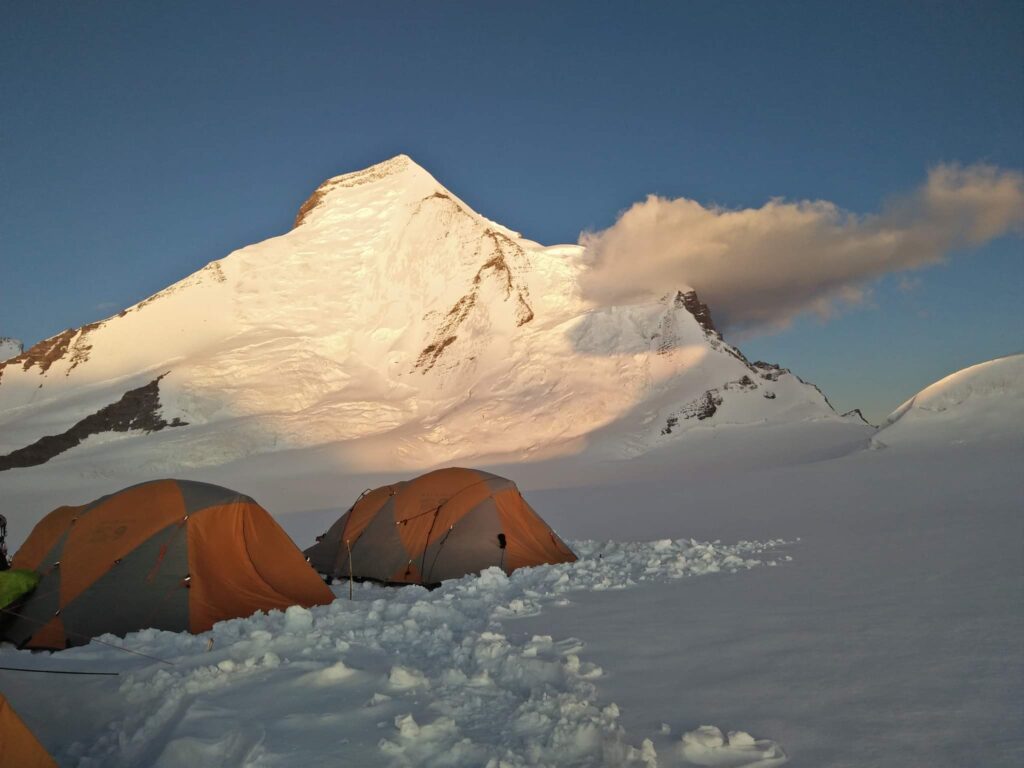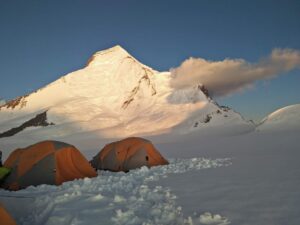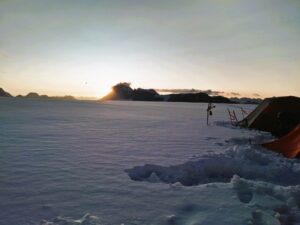- Overview
- Trip Outline
- Trip Inclusions
- Trip Exclusions
- Gallery
- Reviews
- Book Now
- FAQ
About the expedition
At 7135 mts Mt Nun is the highest peak in the Zanskar Valley of Ladakh. It is one of the most beautiful and alluring objective in the Indian Himalayas. This peak provides a challenge not only in terms of technical climbing, but also in terms of acclimatizing. A short trek to another peak close by will provide the necessary acclimatization before attempting Mt Nun.
Mt Nun is a technical peak and is apt for experienced trekkers who want to get an introduction to mountaineering!
To get you up to speed to manage the technical aspects of climbing we will train you for it. (Refer day 7 and 11 in the itinerary).
The area
Ladakh is bordered by the Greater Himalayas in the west and south, the Karakoram in the north and the Tibetean Plateau in the east. These ranges form a natural barrier and does not allow clouds to enter this valley making it a rain shadow region and thus a cold desert. The term Ladakh translates to land of high passes. Some of the highest motorable roads in the world are here. Ladakh is a major tourist destination in the summers.
Expected weather
- Chances of rain/Hail – Chances of rain is very less. One can expect a mild occasional drizzle. Ladakh/Spiti is a rain shadow region and hardly gets any rainfall.
- Snowfall – Possible in August, September on the pass day
- Temperatures – The temperature is a lot cooler in this region as compared to other areas in the Himalayas. Afternoon – upto 20 degrees
Nights – around zero degrees (June) and -12 degrees (September end)
- Day 1: Arrive in Leh (3500 mts).
Check into a hotel. Rest day.
Overnight at hotel in Leh. - Day 2: Acclimatization day at Leh
We may take you to a high point for acclimatization (mostly Khardungla).
Overnight at hotel in Leh. - Day 3: Drive from Leh to Rumtse Phu (4900 mts)
Distance - 86 kms; 3 hours
Overnight at campsite. - Day 4: Trek from Rumtse Phu to summit base camp (5250 mts)
Trek Distance - 6 kms; 6 hours.
Overnight at summit base camp. - Day 5: Summit attempt to Mt UT Kangri (6030 mts) and back to Rumtse Phu
Trek Distance - 10 kms; 10 hours.
Overnight at campsite - Day 6: Drive from Rumtse Phu to Leh
Distance - 86 kms; 3 hours
Overnight at hotel in Leh - Day 7: Rest day at Leh
Optional: Learn rope systems and introduction to rock climbing / scrambling at Shey Monastary.
Overnight at hotel in Leh - Day 8: Drive from Leh to Kargil (2676 mts)
Distance - 217 kms; 7 hours
Overnight at hotel in Kargil - Day 9: Drive from Kargil to Tangol (3700 mts)
Distance - 65 kms; 2 hours
Overnight at hotel/campsite in Tangol - Day 10: Trek from Tangol to Base Camp (4600 mts)
Trek Distance - 8 kms; 7 hours.
Overnight at base camp.
- Day 11: Rest & Acclimatization day at Base Camp
Today, we also train for the summit climb by learning technical techniques required for this climb and we practice rope systems.
Overnight at base camp. - Day 12 to day 18: We will plan the course of these 7 days as per the on ground situation, taking into consideration the weather condition and the fitness/readiness of the participants.
Mt. Nun will have three camps- Camp 1 (5500 mts), Camp 2 (6100 mts), and Camp 3 (6400 mts) which will be the Summit Base Camp.
We will attempt the Summit Push to Mt Nun (7153 mts) from the Summit Base Camp (camp 3) after having duly trained and acclimatized in the days leading to the day of Summit Push.
After the Summit Push we return to Camp 3.
All nights will be at campsites. - Day 19: Trek from Camp 3 to Base Camp
8 to 10 hours
Overnight at base camp. - Day 20: Trek from Base Camp to Tangol
Trek Distance - 8 kms; 4 hours.
Drive from Tangol to Leh
Distance: 282 kms; 9 hours
Overnight at hotel in Leh
- Day 21: Depart from Leh after breakfast.
- Complete Stay and Accommodation (Twin/Triple sharing basis) for the entire duration of the trek.
- All transport as mentioned in the itinerary
- Food from the first day to the last day of the trek (barring lunch in Leh).
- Hotel stay in Leh.
- Airport /Bus stand Pickup. (On trek specific dates only. Note you have to manage your travel yourself if you come early and leave later)
- Rentals for all common gear provided to you like tent, sleeping bags, crampons etc.
- Forest entry permission and camping charges.
- Guide and expertise charges.
- Offloading charges for your backpack . (Offloading is mandatory else you will not have energy left to climb)
- Trek insurance
- 5% GST
- Meals or drinks purchased by participants during the travel or trek (example biscuits, fruits etc)
- Rentals for personal gear (Refer things to get section)
- Trek Insurance (Optional)
- Any extra government charges. (There aren’t any as of now)
- Flight/Train/Bus ticket till Leh.
- Backpack offloading charges. You are expected to carry your own backpack. Trekkers unable to do so can opt for a porterage service at 400/day.
You could come via flight to Leh. Alternatively you could come by road from Manali to Leh (approx 14 hours with breaks) or from Kasmir to Leh (approx 16 hours with break).
Plan to arrive into Leh on Day 1 latest by 5pm in the evening. Plan your return (departure) from Leh on Day 21 after breakfast. We will coordinate arrival and departure timings of all trekkers once the group is formed for airport pick ups and drops
A certified trek leader, a guide, cook & porters will accompany you during the trek
The common perception is that alcohol makes you feel warmer, however it also dehydrates you & dehydration can be fatal while trekking. Hence consumption of alcohol is prohibited. Smoking in camps is not allowed.
We will be taking insurance for each trekker, the cost of which is included in the trek price.
Good Sturdy Backpack: Prefer a trekking pack over a backpacking one. The size of the backpack depends upon the participant. Normally for a 7-9 day trek a 50-60 litre pack should suffice.
Shoes: Any waterproof trek (not hike) shoes would be ideal.
Socks: 3 pair cottons/performance and 3 pairs of woollens.
Trek pants (Ideally Water Resistant): Get one quick dry summer trek pants and one thicker/shell pants. If you don’t have trek pants you can replace it with Gym track pants.
T-shirt/Base layer: Get 3 T-shirts/ trekking base layer on the trek, two of which should be thick and full sleeve. Avoid cotton and prefer dry fit.
Fleece/ Sweater/ good quality Hoodie: Get 1 fleece jacket or sweater. Fleece is preferred over sweater or hoodie as it is lightweight and easy to carry. Sweaters and Jackets can be heavier than Fleece for the warmth they offer.
Down/ Padded Jacket – Down/ Padded jacket (Upto -10 degrees ). If you don’t want to get a padded/ Down jacket, get two fleeces.
Cotton track pants for camp – These are specifically for cold evenings at the campsite. This can be ignored if you are comfortable wearing your trekking pants in the camp.
Thermals: 1 pair. We wear thermals only upon reaching the campsite not while trekking.
Windproof Jacket: All rain proof can be used as wind proofs. Required as an additional layer during trekking in windy conditions. Avoid if you have a rain proof jacket.
Rainwear:
Option A – Rain set – One Waterproof jacket (3000 mm waterproofing), Rain proof pants and Bag cover
Option two – Poncho that covers your body and bag completely.
We ideally recommend Option 1 as poncho makes trekking difficult.
Woolen Cap/ Balaclava -1: To cover your ears, head and neck.Get one woolen cap and one neck warmer or balaclava.
Neck Warmer/ Scarf -1: For evenings. Avoid if you are comfortable using a Balaclava.
Gloves: 2 gloves out of which 1 can be water proof and one woollen. The waterproof one has to ideally be padded and a size larger than you normally use. This is so that you can wear both your gloves together if required.
Suncap – 1
Sunglasses – 1
Toiletries – Also include sunscreen, moisturizer and lip-cream
Headlamp/Torch – 1. Preferably headlamp.
2 water bottles (1 litre each) – One can be a thermos flask. One can also get a hydration pack.
Camp shoes/ Flip flops for camp
Plastic covers for inside the backpack to keep your clothes dry
Day pack – Required if you have a summit days climb. Preferably one that can be compressed.
Documents: 2 passport sized photograph, Address and Photo proof (Driving License or Aadhaar card), Doctor’s medical certificate saying that you are fit for the trek. We reserve the right to not take you on the trek if you fail to produce this.
Trekking pole
Meals will be provided by us. However you may carry snack items to much on like dry fruits, biscuits, chocolates, protein bars, or nuts.
Offloading your bagpack is mandatory for this trek, else you will not have energy left to climb. Offloading charges are included in the trek price
8 - 10 kms slow jog OR 30kms kms cycling. Pace is not important, consistency is important (non-stop jogging/running/cycling)
Squats 50 x 3, Lunges 50 x 3, Calf raises 50 x 3
All of the above at least 6 times a week
Climbing stairs 100 floors with backpack (Once a week, ideally after a run)
In all the camps where the accommodation is in tea houses/ home stays, there will be proper toilets. The toilets are mostly western, in case if they‘re Indian, then we try to provide a toilet seat most of the times.
On the day of camping, we will have toilet tents (with a dry pit toilet), the most hygienic way of answering nature’s call.
A dry pit toilet is an eco-friendly sanitation solution featuring a pit dug into the ground, topped with a toilet seat and a wrought iron stand. Near the toilet, a pile of mud, sand, or coco peat is provided for covering waste after use, facilitating rapid breakdown of fecal matter due to increased microbial activity. This method eliminates the need for water, thereby preventing contamination of nearby water sources, as water toilets are prohibited at campsites.
While toilet paper is available, please use it sparingly to avoid overloading the pit, which can take years to decompose. Please refrain from using wet wipes as they are not bio degradable or use bio-degradable wipes.
You will be sleeping in twos or threes in your tents in sleeping bags. The sleeping bags are snug and comfortable. We will be providing inflatable pillows.
We’ve been organizing treks for over five years and have had many female trekkers trek with us. In fact, a lot of them come solo for treks. There has never been a complaint about the atmosphere of a trek, about other trekkers or our professionalism. They have all been kind enough to leave a review.
If you cancel –
– 60 days before the trip: we can process a complete refund minus minimum processing charges.
– Between 30-45 days before the trip: you will be refunded 50% of the trek fee.
– Within 30 days before the trek starts: No refund.
– If your spot is replaced in a full batch: we will process a complete refund after canceling minute operational charges. (For fixed departures only)




There are no reviews yet.